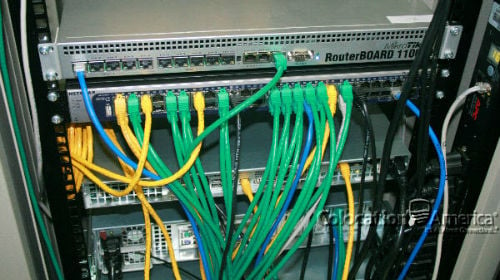Why a Dedicated IP Address is Important
Behind every domain name is an IP address that acts as the real address. Domain names came into existence to be used as shortcuts for their complicated IP address counterparts. Instead of having to remember a long string of numbers such as 192.168.0.1, web users can use a simple domain name instead (www.websitename.com).
How Does the IP Address Affect Search Engine Rankings?
From a Search Engine Optimization (SEO) perspective, an IP address tells the story about where a website is hosted. While websites hosted on dedicated servers obtain the advantage of having their own dedicated IP address, websites on shared hosting plans will have to share the same IP address hosted on one server with other websites or opt for SEO Hosting services. So, the answer to how to rank in search engines is simple—start with dedicated IP web hosting! Using a shared IP address can lead to a host of potential security threats and search engine discrimination. Depending on the web hosting provider and/or shared hosting plan, a website will often share an IP address with thousands of other websites. Not only does this significantly slow down the website, but it is widely speculated that websites with shared IP addresses will rank lower on search engines than websites with a dedicated IP.

Although no one can say for sure except for the technicians who write the algorithms over at Google and Bing, SEO experts have collectively arrived at this conclusion after extensive research. An advantage that websites hosted on dedicated servers possess is the fast loading speed, which major search engines consider a significant factor in a website’s value. This advantage also applies when viewing a site from a consumer’s viewpoint. If a website is sharing an IP with hundreds or thousands of other websites, the loading speeds will be considerably slower and the visitor will become frustrated and leave, sometimes never coming back.
Can I Check If a Website Is Hosted on a Dedicated or Shared Server?
There are many websites devoted to the purpose of checking the domain information of a website, including IP address and server type. Whois is a widely used domain information grabber that provides all the basic features and data you need to check if your website, or any other website, is hosted on a shared server or a dedicated server. Simply go onto Whois and enter in a domain name and it will show the results. Here is an example of a website hosted on one of the top shared web hosting providers:

Here is an example of a website hosted on a dedicated server:

It is common for a website with shared hosting to be hosted on a shared server with thousands of other websites. When hosted from a dedicated server, a website shares the server with absolutely no one else.
Shared Hosting vs. Dedicated Hosting
Hosting on a dedicated server automatically gets you a dedicated IP, whereas shared hosting doesn’t. Some shared hosting providers are well aware of this distinction and offer the option of purchasing a dedicated IP for a website hosted on a shared server. Despite having a dedicated IP, websites on shared hosting will still suffer the same disadvantages such as slow loading speeds and limited control. Even worse, purchasing a dedicated IP address on a shared server will not protect a website from being blacklisted when a neighbor website on the server is blocked for hosting illegal or pornographic websites. Realtime blackhole lists (RBLs) will recognize that a website is on the shared server despite a dedicated IP and will penalize it accordingly. The only way to prevent a website from being brought down by its mischievous neighbors is to be hosted on a dedicated server.

Dedicated IPs will not speed up your website performance if it is on a shared server. This is especially important to note for SEO purposes. The slower the website loads, the harder it will be for the search engine’s spiders to index the website. This leads to fewer inner pages being picked up in the search engine, which lowers the website’s SERP rankings and domain authority. Be careful of web hosting providers who advertise faster performance after purchasing a dedicated IP on a shared hosting plan.
How Can I Improve My Search Engine Rankings?
At the end of the day, the best way to do SEO and gain search engine rankings is to simply create a good website.
- Provide high quality and unique content that people want to read or use.
- Properly organize the website by applying proper meta-data.
- Offer a variety of content including images and video.
These basic factors will bring a website to the top of search engine pages but do require hard work and dedication. SEO hosting is a great way to raise your search engine rankings while significantly easing up the workload on yourself. Colocation America offers top quality SEO services that will bring results using honest and effective methods, without any of the risky shortcuts.
Why Your Hosting Location Affects Your SEO Rankings
Google always strives to make sure users find content that is relevant to them. According to John Mueller, a webmaster analyst at Google Switzerland, most people would rather have content written in their native language than find a high quality product. That is why Google has different search results for people in different regions. Google takes into consideration the location of your server when ranking your website. You are more likely to rank well in the same region your server is located.

Your server location is a significant variable when you are ranking with Google. However, you may still rank well in other regions. Hosting a web server in a country that has more advanced web servers will probably help your rankings more regardless of what region you are trying to target. That is one of the reasons most websites in smaller Asian countries use hosting providers in the United States. They rank higher in the search engines and their websites are more reliable for their visitors. It is always a plus to choose a server in the region that you are targeting. However, you should make sure that you take other factors into account as well. You can also help your site rank better by using a geo-targeted domain. Websites that have these domain names are automatically going to rank higher in the region denoted with the domain extension. The location of the server will be completely irrelevant. You may want to look into getting a country specific domain if you are going to be targeting a specific region.
You may want to consider buying your hosting plan from the region that you are trying to reach. This may have some SEO benefits and reduce the time it takes for your visitors to load sites. However, it is much more important that you choose a hosting provider that is reliable. Your search engine rankings will suffer if you host your website with a provider that is always crashing. If you are going to choose a hosting provider overseas to reach your audience in that region then you will want to review their uptime guarantees, bandwidth capabilities and other features carefully. There are other options that you may want to consider instead to ensure that you get the rankings that you want. You may want to target visitors with the same website on different domain names. You can use different ccTLDs for the different regions that you want to target. This saves you the hassle of needing to find different hosting providers for the different domains for the regions that you want to target. The Google Webmaster team also says that it generally isn’t necessary to hide duplicate content with robots.txt files or non-indexing.
